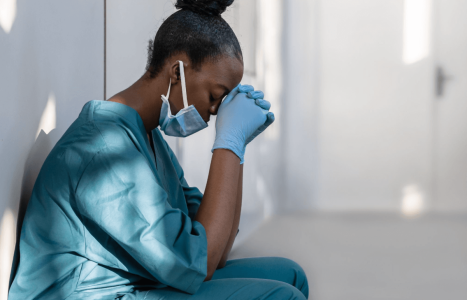Understaffed and overwhelmed: Healthcare worker reveals patients are dying in hospital waiting rooms
- Replies 28
As we get older, we sadly start to become more and more familiar with the medical system, whether it be through our own medical appointments or those of our family members.
It's no secret that the healthcare system in Australia is under a lot of strain. That said, it's still very concerning to learn of any issues within the system. This is especially true in Australia's most populous state: New South Wales, where a frontline healthcare worker recently made a shocking claim.
One hospital worker at Westmead Hospital in Sydney recently gave a concerning insight into what it's like to work at the hospital, and it gave us an alarming reminder of the current state of Australia's public health care system.
Compared to the good old days, when a hospital visit meant a properly attended ward, the informant alleges conditions have gone south for people—patients and workers alike.
Preparing for a shift, they say, is like 'preparing for battle'.

'I don't want to look another patient's relative in the eye and say they have died in our waiting room,' the healthcare worker said.
'They have died because the emergency department was so overcrowded that patients we have already seen have not moved on, and we can't treat new patients.'
They also said they're forced to provide 'substandard' care in a hospital corridor and that they often feel like they're trying to resuscitate someone in a space that wasn't created for such a task.
On top of that, the worker advised that if people were actually facing a serious medical situation, they would be better off driving to Royal North Shore (which is some distance away), where they could receive better care than at Westmead Emergency.
The whistleblower's comments are a bleak reminder of an alarming situation for the health care system in Australia, one that's only made worse with the population continuing to increase.
As further evidence of Westmead Hospital's growing levels of overcrowding, a snapshot of a weekday in May this year shows 21 patients in the emergency department, and one of them had to wait for nearly two days after waiting 41 hours for a bed in the hospital.
Commenting on the media around the hospital's crowding levels, Health Minister Ryan Park said that the system had to do better and that he'd focus on making sure hospitals were adequately staffed in the months and years ahead.
In light of the whistleblower's comments, Western Sydney Local Health District Chief Executive Graham Loy acknowledged that the hospital had experienced some high levels of patient load in the emergency department, stating sorry to 'anyone who may have experienced a long wait time'.
He added that the Local Health District was 'working hard to improve the way we manage patient demand, increase staffing levels and invest in programs to provide alternative pathways for urgent care and ease pressure on our emergency departments'.

It's a worrying time for healthcare workers who are seeing first-hand the substandard conditions they're sometimes forced to work in—and here at the SDC, we hope the right action is taken soon.
If you or someone you know is in an urgent medical situation but not in life-threatening circumstances, please call Healthdirect Australia on 1800 022 222 for a 24-hour telephone health consultation.
Members, we would greatly appreciate hearing your perspectives on the current situation. Have you observed any signs of overcrowding or encountered similar issues at your local hospital? We encourage you to share your experiences and insights in the comment section below.
It's no secret that the healthcare system in Australia is under a lot of strain. That said, it's still very concerning to learn of any issues within the system. This is especially true in Australia's most populous state: New South Wales, where a frontline healthcare worker recently made a shocking claim.
One hospital worker at Westmead Hospital in Sydney recently gave a concerning insight into what it's like to work at the hospital, and it gave us an alarming reminder of the current state of Australia's public health care system.
Compared to the good old days, when a hospital visit meant a properly attended ward, the informant alleges conditions have gone south for people—patients and workers alike.
Preparing for a shift, they say, is like 'preparing for battle'.

A healthcare worker from Westmead Hospital, Sydney, has revealed that overcrowding is leading to patients dying in the waiting rooms. Credit: Shutterstock.
'I don't want to look another patient's relative in the eye and say they have died in our waiting room,' the healthcare worker said.
'They have died because the emergency department was so overcrowded that patients we have already seen have not moved on, and we can't treat new patients.'
They also said they're forced to provide 'substandard' care in a hospital corridor and that they often feel like they're trying to resuscitate someone in a space that wasn't created for such a task.
On top of that, the worker advised that if people were actually facing a serious medical situation, they would be better off driving to Royal North Shore (which is some distance away), where they could receive better care than at Westmead Emergency.
The whistleblower's comments are a bleak reminder of an alarming situation for the health care system in Australia, one that's only made worse with the population continuing to increase.
As further evidence of Westmead Hospital's growing levels of overcrowding, a snapshot of a weekday in May this year shows 21 patients in the emergency department, and one of them had to wait for nearly two days after waiting 41 hours for a bed in the hospital.
Commenting on the media around the hospital's crowding levels, Health Minister Ryan Park said that the system had to do better and that he'd focus on making sure hospitals were adequately staffed in the months and years ahead.
In light of the whistleblower's comments, Western Sydney Local Health District Chief Executive Graham Loy acknowledged that the hospital had experienced some high levels of patient load in the emergency department, stating sorry to 'anyone who may have experienced a long wait time'.
He added that the Local Health District was 'working hard to improve the way we manage patient demand, increase staffing levels and invest in programs to provide alternative pathways for urgent care and ease pressure on our emergency departments'.
Key Takeaways
- A healthcare worker at Westmead Hospital in Sydney has claimed that overcrowding is leading to patients dying in the waiting rooms.
- The unidentified worker suggested that individuals should drive to Royal North Shore Hospital to receive better care.
- A patient reported sleeping on the waiting room floor for hours and subsequently remaining in the emergency department for three days due to a lack of available beds.
- Western Sydney Local Health District CEO, Graham Loy, acknowledged high patient loads and extended wait times, announcing increased staffing and new programs to alleviate the strain on emergency departments.
It's a worrying time for healthcare workers who are seeing first-hand the substandard conditions they're sometimes forced to work in—and here at the SDC, we hope the right action is taken soon.
If you or someone you know is in an urgent medical situation but not in life-threatening circumstances, please call Healthdirect Australia on 1800 022 222 for a 24-hour telephone health consultation.
Members, we would greatly appreciate hearing your perspectives on the current situation. Have you observed any signs of overcrowding or encountered similar issues at your local hospital? We encourage you to share your experiences and insights in the comment section below.







